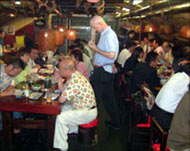Japan puts brave face on bad news
On the surface, Japan has shrugged off the 13-year recession that brought the economy virtually to its knees.

Wrapped up against the cold, people are doing their last-minute New Year’s shopping in preparation for that traditional Japanese celebration.
Bonuses were paid into accounts at the start of the month – and are rapidly being spent – while restaurants and bars are full of revellers in the annual bonenkai, or end-of-year parties.
But looks – as Japan has been warned in the past – can be deceptive.
A slew of reports from government, businesses and corporate leaders in recent weeks have shown a worrying trend, according to economists: They are nearly all negative.
Department store sales plummeted in November by nearly 6%; the Japan Business Federation warned this week that there was little room for pay increases; the Ministry of Finance slashed the 2005 budget to Y47.1 trillion ($4.4018 trillion) from Y47.6 trillion last year; and the Cabinet Office issued a plan to finally wipe out deflation – but not until 2006.
Tankan watch
However, there was some good news among the unrelentingly bad the government has been quick to point out: Capital spending at big firms was up for the first time in four years in 2004 and real economic growth is likely to be 1.6% in fiscal 2005, up from an earlier prediction of 1.4%.
But the optimism was short-lived.
The most closely watched indicator of Japan’s economic wellbeing is the Bank of Japan’s quarterly Tankan or short-term outlook.
Released in mid-December, it showed that major manufacturers’ business confidence has dropped, undermining the government’s claim that the economy is experiencing an adjustment phase that it will soon shake off.
And while the average Japanese person may see the statistics and hear the analysts’ conclusions on the evening news, he or she is not really affected by the larger scheme of things.
All Mr and Mrs Tanaka want to do is pay the mortgage, keep food on the table and put a little away every month for retirement.
Caution
“All we can do is be very careful every month to make sure we have enough coming in to pay the bills,” said Mutsuko Tsuyuki, a housewife who lives in Yokohama.
“We have got through this year OK and we even managed a holiday, but December and January are expensive months for us and many other people.”
 |
|
Taxes may bring an end to |
By an unfortunate quirk, city taxes for the Tsuyuki family fall due in the same six-week period as Christmas, New Year, and the expensive annual roadworthiness test for the car and insurance payments. Add on their son’s school ski trip and they are dipping into their savings.
“In the years of the bubble economy, people just had too much money,” says Tsuyuki. “They spent so much money on things they did not need or even want because they thought life was going to be like that for ever.
“But now we know different and those who spent all their money are in deep trouble,” she says.
“We never thought the banks would stop handing out loans for cars, holidays or to set up a new business,” she adds. “We never considered the possibility that the breadwinner in the family might lose his job or the kids not be able to find work when they grew up. But that’s what happened.”
Belt-tightening
The new national frugality that spread after the bubble burst inevitably became a vicious cycle; falling spending power hurt the retail sector and in the nearby Isezaki-cho shopping district, stores that were able to hang on through a decade of recession have finally given up the economic ghost.
 |
|
Many Japanese just work to keep |
In a small park beside the canal where children used to play while their mothers sipped lattes, homeless people have set up their cardboard shacks.
“Ginza and Roppongi and the other districts of central Tokyo look vibrant and busy, but if you go into the suburbs, the shutters are up over many shops and if you go further out, into the countryside, then you can really see the stagnation,” says Paul Sheard, an economist with Lehman Brothers in Tokyo.
And while he agrees that there has been a gradual improvement in the general state of Japan’s economy, he believes it is built on very shaky foundations.
Deflation
“I’m very sceptical about the sustainability of this recovery for the fundamental reason that I don’t have confidence in the government’s policy framework and how policy is being managed in Japan,” he said.
Describing it as an “extraordinary economy in an abnormal state of affairs”, Japan’s economy has been in a deflationary spiral for a decade, the “sick and shrinking” banking system has been nursed along by the government for a similar length of time, interest rates have been at historic lows and the Bank of Japan’s approach to combating deflation and the associated ailments has been “defeatist”, he said.
|
“Our judgment is that policies to reverse these problems have not been aggressive enough” Paul Sheard, economist with Lehman Brothers, Tokyo |
“Our judgment is that policies to reverse these problems have not been aggressive enough. There has been no fiscal stimulus by the government and therefore, the recovery will not be strong enough or sufficiently long-lasting to get Japan’s recovery back on track,” he said.
Other analysts say this assessment is overly pessimistic, of course, with Stefan Worrall at Credit Suisse First Boston suggesting that the economy has simply hit a soft patch rather than going into a slump.
But most agree the situation today is delicate.
Come 1 January and the equally traditional post-celebration hangover, it remains to be seen whether the economy will be suffering a similar hangover after the spending excesses of December.